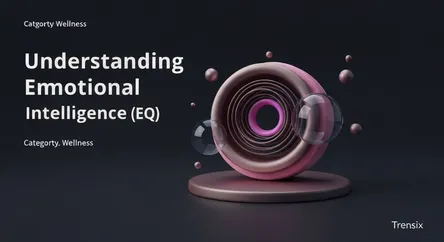Wellness
Understanding Emotional Intelligence (EQ)

Explore what emotional intelligence is, why it's a key skill for success, and how it positively impacts your personal and professional life.
What is it?
Emotional intelligence (EI), often measured as an emotional quotient (EQ), is the ability to perceive, understand, manage, and use emotions. It involves recognizing your own feelings and those of others, and using this awareness to guide your thinking and behavior. The concept is typically broken down into four core competencies: self-awareness, self-management, social awareness, and relationship management. Unlike IQ, which is generally stable, emotional intelligence is a flexible set of skills that can be learned and improved over time.
Why is it trending?
Emotional intelligence is increasingly recognized as a crucial factor for success, at times considered more important than IQ. In the workplace, 71% of employers value EQ more than technical skills. Companies are investing in EI training to improve leadership, navigate business transformations, and prepare for a future where human connection is vital. Emotionally intelligent leaders are shown to foster higher employee engagement and productivity. This focus on "soft skills" is a response to the understanding that high EQ leads to better performance, teamwork, and decision-making.
How does it affect people?
Developing emotional intelligence can significantly improve well-being. It enhances your ability to manage stress, resolve conflicts effectively, and communicate with empathy. People with higher EQ tend to have stronger relationships, better mental health, and greater life satisfaction. By understanding and managing your emotions, you can avoid making impulsive decisions and navigate social complexities with more grace and confidence. Ultimately, it empowers individuals to build a more connected and successful personal and professional life.